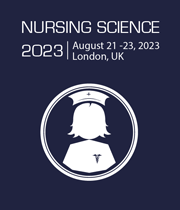Elvessa Narvasa, Quebec CCN, Canada
Advancement in technology changes the world in a warp speed. Wearable devices holds great potential in reshaping the health provision and has a positive impact on the wearer’s health. We are seeing growing numbers of users actively changing their behavior for the better wit [....] » Read More
















































Title : Nurse as designer: Innovative practice contributing to nursing science
Jean Ross, Otago Polytechnic, New Zealand
Nurses within contemporary landscapes of care do not recognise themselves as designers, this is despite Florence Nightingale been acknowledged as a leading nurse designer in the 1800s. Acknowledging nurses as designers is now a hidden aspect of everyday nursing practice, which we [....] » Read More
Title : Creating a culture of mentorship: Empowering nurses to reach their full potential
Robin Adams Geiger, Ingenovis Health, United States
Mentorship is an essential component of nursing practice that has been shown to improve job satisfaction, retention rates, and patient outcomes. Mentorship can also help health care organizations and academic institutions retain nurses and nurse educators, which can curb a shorta [....] » Read More
Title : Strengthening community partnerships: Improving health outcomes among persons experiencing homelessness
Latiena F Williams, University of South Florida, United States
Background/Significance: Homelessness is a major public and social health problem. For years, nurses have been on the frontline with a substantial and significant role in caring for the most vulnerable populations in guiding, assisting, and aiding the homeless to access health a [....] » Read More
Title : Nursing education: Back to business as usual or moving towards the new normal
Robyn Peel, Western Health, Australia
Education was very important in successfully managing acutely ill patients with COVD 19. Educators spent all their time in clinical areas teaching skills one to one to nursing staff. This was labour intensive but skills were acquired and patients were safe. After significant lock [....] » Read More
Title : Telehealth in the new nursing world
Jennifer Nanna, Current Health, a Best Buy Health Company, United States
Technology has greatly impacted how the care of patients is delivered, changing the field of nursing dramatically over the last 3 years. The increase in the use of telehealth has allowed for the profession to grow by providing increased flexibility and the demand for new roles. N [....] » Read More
Title : Nurse-educators’ perspectives on the academic performance of graduate entry nursing (GEN) students on the MSc mental health nursing programme
Modupe Oshadiya, Kings College London, United Kingdom
Understanding the perspectives that nurse educators have on the academic performance GEN students offers a unique contribution to the discussion around nursing as a relative newcomer to the professional socialisation process. This study sets to understand what the perspective of [....] » Read More
Title : Nurse-educators’ perspectives on the academic performance of Graduate Entry Nursing (GEN) students on the MSc mental health nursing programme
Georgiana Assadi, Kings College London, United Kingdom
Understanding the perspectives that nurse educators have on the academic performance GEN students offers a unique contribution to the discussion around nursing as a relative newcomer to the professional socialisation process. This study sets to understand what the perspective of [....] » Read More
Title : A qualitative study on the women who experienced a stroke
Pin Lo, Taichung Veterans General Hospital, R.O.C(Taiwan), Taiwan
In recent years, gender issues have been highly valued all over the world, and women's health is also a topic of policy attention. When women cannot complete self-care and require help from others due to stroke, whether their needs can be properly understood and satisfied bec [....] » Read More
Title : The impact of work environment on nurses' compassion in the Intensive Care Units
Sepideh Naseri, Leeds Community Healthcare NHS Trust, United Kingdom
Background: Compassionate care has been introduced as the main part of the nurses' identity and a most valuable asset. The characteristics of the work environment may facilitate or hinder the provision of compassionate nursing care. Aims: Considering the importance of c [....] » Read More
Title : A conceptual framework for cultivating attentiveness in nursing
Rudo Juliet Ramalisa, Vaal University of Technology, South Africa
Background: There is a dearth of literature on attentiveness and its cultivation, although it is significant to care and ethics of care. An attentiveness approach in healthcare, more over South African healthcare may “reconstruct and revitalise the nursing profession for a [....] » Read More
Title : Achieving mutual benefits in nursing academic-service partnership: A scale developmental and psychometric evaluation
Maliheh Sadeghnezhad, University Hospital Lewisham, United Kingdom
To develop and assess the psychometric properties of the achieving mutual benefits scale in nursing academic-service partnership. The first step taken for the establishment and continuation of successful academic-service partnership is the identification of mutual benefits of par [....] » Read More
Title : Aggression against health care professionals, a critical review
Tom De Keyser, University Hospital Ghent, Belgium
Introduction: Aggression to health care professionals (HCP) is a common occurrence both in psychiatric or non-psychiatric inpatient and outpatient settings. The overall prevalence of patient perpetrated violence (workplace violence - type 2) ranges from 9.5% to 74.6%, depend [....] » Read More
Title : Evaluation of patient fall preventive program on nurses' knowledge and the number of patient falls in one of the teaching hospitals of Mashhad in 2022
Maliheh Sadeghnezhad, University Hospital Lewisham, United Kingdom
The current study examined the effect of patient fall preventive program on nurses knowledge and number of patient falls in one of the teaching hospitals in Mashhad, Iran. This was a quasi-experimental study was conducted on 600 nurses employed in the hospital affiliated to Mashh [....] » Read More
Title : How do performance-based examination influence learning? An evaluative study of BS nursing student perception
Arlene V Pamplona, Oman College of Health Sciences, Oman
Assessment of clinical competence is an essential component of nursing education, as the students’ clinical nursing skills and performance are the foundation of their professional practice. Current literature revealed that over the past few decades, Objective Structured Cli [....] » Read More
Title : Clinical economics: A new task for different levels of the nursing professions
Franz Porzsolt, Institute of Clinical Economics, Germany
Clinical Economics (CLINECS) was born 45 years ago from the different results that I observed as a young oncologist in our hospitalized patients and read in the scientific literature. It took more than 10 years for us to realize the cause of this difference: the results reported [....] » Read More
Title : Caring in nursing education
Maria Kozlowski Gibson, Cleveland State University, United States
A lifetime of nursing education is a necessity because of the continuous scientific advancements changing the nursing practice. The role of nursing educators as facilitators of student development increases the conditions for academic success of graduate and Registered-Nurse-to-B [....] » Read More
Title : The importance of health literacy for new nurses
Michele L Lopez, Pace University, United States
This session will provide a framework identifying key concepts for workshop participants to apply in their own environments which will proactively address potential health literacy deficiencies. It is essential that nursing students become familiar, comfortable, and competent in [....] » Read More
Title : "Why is reflection essential to nursing practice"
Sue Roe, The Roe Group Enterprises, LLC, United States
Reflecting on practice is not new. It has been defined, discussed, researched, and is considered best practice in the workplace. Its definition and scope is clear and straightforward. It is one’s ability to reflect on actions needed to engage in a process of continuous lear [....] » Read More
Title : Developing a nursing department structure: Integrating three university nursing departments
Laurie Bladen, Pennsylvania Western University, United States
In July 2021, the State System of Pennsylvania, United States of America, Board of Governors voted to integrate three Universities into one university. On July 1, 2022, Clarion (CU) and Edinboro (EU) integrated with California University (CalU) to become Pennsylvania Western Univ [....] » Read More
Title : Effect of combined social communication platform in breast cancer patients
Jing Yi Lin, National Taiwan University Cancer Center, Taiwan
Purpose/Background: In Taiwan, breast cancer is the first common cancer among women. Patients who were usually feeling anxious when they were newly diagnosed with breast cancer. Information explosion and incorrect information also can lead them to confuse awfully. Owing to l [....] » Read More